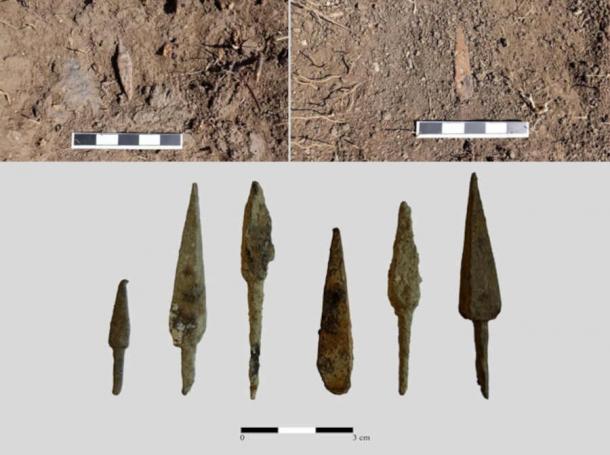In addition to the 700 plus objects unearthed exactly a year ago, and along with arrowheads discovered in the last week of August, archaeologists have uncovered further evidence of the physical traces of the Battle of Malazgirt. The epic late-11th century conflict, contested between the dwindling Byzantine Empire and the Seljuks, has been a source of awe and mystery for centuries. Now, archaeologists have discovered a monumental new structure, 7 meters (23 feet) in size with a square plan containing five graves, pointing to the possibility of Seljuk martyrdom at the site.

Structure found at the site of the Battle of Manzikert, Mus, Türkiye. (Alparslan University)
Battle of Malazgirt: Changing Turkey Forever
As part of The Malazgirt Battlefield Archaeological Project, archaeologists have focused their efforts on uncovering the material evidence of the 1071 AD battle that forever changed world history. As a result of this battle, Byzantine authority declined in Anatolia and Armenia, paving the way for the gradual Turkification of Anatolia, and the eventual blossoming of the Ottoman Empire.
Turkish nationalists often allude to this battle as a legendary starting point for the Turkish nation. It took nearly four centuries for the Ottomans, who were descended from the Seljuk clans, to finally conquer what is now Istanbul. Interestingly, the Seljuks at the Battle of Manzikert were likely more culturally linked to what is modern-day Iran than to Turkey.
The project, initiated in 2020 with backing from the Ministry of Culture and Tourism, the General Directorate of Cultural Heritage and Museums, and Muş Alparslan University, involves 42 academics from various universities, all working under the guidance of the Ahlat Museum, reports Turkiye Today.
“We are conducting the first comprehensive battlefield archaeology in Türkiye to pinpoint the exact location of the Battle of Manzikert,” said Professor Dr. Adnan Cevik from Mugla Sitki Kocman University, the project’s scientific advisor. “We focus on metal objects that trace the battle and human casualties caused by the conflict. The area where we are excavating is related to human losses of the battle.”

Artifacts gathered at the Malazgirt site. (Alparslan University)
Malazgirt Battlefield Project
The second phase of the 2024 excavation has commenced, focusing on a cemetery site in the Afşin District of Malazgirt. This area is thought to have been either the “Seljuk Headquarters” or the “Seljuk Martyrdom” during the historic Battle of Manzikert.
As part of the project, archaeologists conducted a comprehensive survey across 150 square kilometers of the Malazgirt plain, utilizing geophysical scanning and exploratory methods to accurately determine the location of the battlefield.
Prof. Dr. Yunus Levent Ekinci, in conversation with Al Parslan, stated that they are examining the physical parameter contrasts such as the magnetization intensity, specific resistance, and density of the underground geological structures through surface measurements.
He said:
“With this method, we interpret the geological images we obtain from underground. On the maps we create based on this interpretation, we identify color tones that are anomalies, not fitting the geological structure of the ground. Through these studies, we have identified many grave covers.”

Arrowheads found in the Malazgirt Historical Muslim Cemetery, Malazgirt, Mus, Türkiye. (IHA)
Excavation efforts have uncovered various artifacts, including arrowheads, fragments of swords and spears, along with gold and bronze Roman coins found in the same strata. The coins bear the seal of Emperor Romanos IV Diogenes, who, following the battle, was captured and imprisoned.
Additionally, the team unearthed a cross necklace dating back to the 11th century AD, along with graves from the Seljuk period, and hundreds of metal objects related to the battle. According to Project Coordinator Dr. Oğuzhan Karaçetin, these findings are currently being prepared for exhibition in the Muş and Ahlat Museums.
Dr. Karaçetin highlighted the project’s broader goal of developing a new methodology for battlefield archaeology. He expressed confidence that the advanced scanning technologies and techniques being applied in this project will serve as valuable tools for future battlefield excavations.
Top image: Manzikert Battle, painting from Istanbul Military Museum. Source: Istanbul Military Museum
By Sahir Pandey
